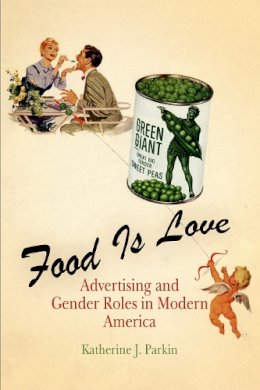
Food Is Love: Advertising and Gender Roles in Modern America
Katherine J. Parkin
Modern advertising has changed dramatically since the early twentieth century, but when it comes to food, Katherine Parkin writes, the message has remained consistent. Advertisers have historically promoted food in distinctly gendered terms, returning repeatedly to themes that associated shopping and cooking with women. Foremost among them was that, regardless of the actual work involved, women should serve food to demonstrate love for their families. In identifying shopping and cooking as an expression of love, ads helped to both establish and reinforce the belief that kitchen work was women's work, even as women's participation in the labor force dramatically increased. Alternately flattering her skills as a homemaker and preying on her insecurities, advertisers suggested that using their products would give a woman irresistible sexual allure, a happy marriage, and healthy children. Ads also promised that by buying and making the right foods, a woman could help her family achieve social status, maintain its racial or ethnic identity, and assimilate into the American mainstream.
Advertisers clung tenaciously to this paradigm throughout great upheavals in the patterns of American work, diet, and gender roles. To discover why, Food Is Love draws on thousands of ads that appeared in the most popular magazines of the twentieth and early twenty-first centuries, including the Ladies' Home Journal, Good Housekeeping, Ebony, and the Saturday Evening Post. The book also cites the records of one of the nation's preeminent advertising firms, as well as the motivational research advertisers utilized to reach their customers.
Product Details
About Katherine J. Parkin
Reviews for Food Is Love: Advertising and Gender Roles in Modern America
Library Journal
"A singularly revealing insight into this consumptive and surprisingly constant dimension of the American female and cultural psyche."
-Midwest Book Review
"Food Is Love is well-written, comprehensive, and compelling, and makes a significant contribution to the literature on advertising history and women's studies."
Jennifer Scanlon, Bowdoin College
"The engagingly titled Food Is Love is also an engaging read. Its comprehensiveness, its clear organization, and the authority it commands through its evidence make this book a valuable resource for scholars, and it should be widely adopted in classes in advertising history, women's history, and American cultural history."
Journal of American History
